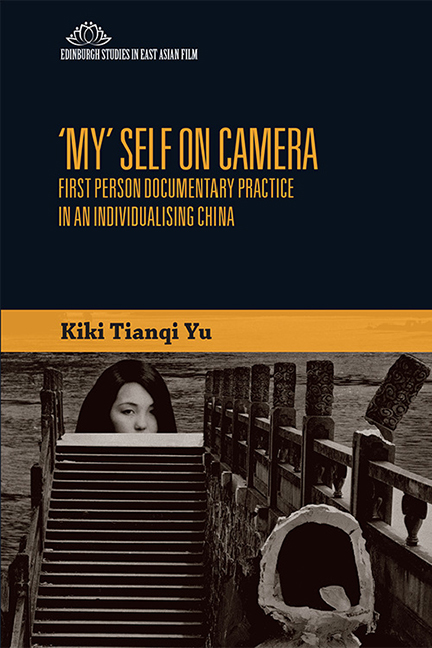Book contents
- Frontmatter
- Contents
- List of Figures
- List of Main Terms with Chinese Translations
- List of Names with Chinese Character Translations
- Acknowledgements
- Dedication
- Introduction: Action, Amateurness and the Changing Sense of the Individual Self
- 1 Female First Person Documentary Practice: Negotiating Gendered Expectations
- 2 Amateurness and an Inward Gaze at Home
- 3 Nostalgia toward Laojia: Old Home as an Imagined Past
- 4 First Person Action Documentary Practice: Longing for a More Politicised Space
- 5 The Problematic Public Self: Ethics, Camera and Language in Contestable Minjian Public Spaces
- 6 Camera Activism: Provocative Documentation, First Person Confrontation and Collective Force
- 7 Whose Self on Camera? Motives, Mistrust, Disputed Authenticities
- 8 From Fragile First Person Documentary Practice to Popular Online First Person Live Streaming Broadcast – Zhibo: Changing Intentions, Changing Individual Selves
- Filmography
- Bibliography
- Index
Introduction: Action, Amateurness and the Changing Sense of the Individual Self
Published online by Cambridge University Press: 10 November 2020
- Frontmatter
- Contents
- List of Figures
- List of Main Terms with Chinese Translations
- List of Names with Chinese Character Translations
- Acknowledgements
- Dedication
- Introduction: Action, Amateurness and the Changing Sense of the Individual Self
- 1 Female First Person Documentary Practice: Negotiating Gendered Expectations
- 2 Amateurness and an Inward Gaze at Home
- 3 Nostalgia toward Laojia: Old Home as an Imagined Past
- 4 First Person Action Documentary Practice: Longing for a More Politicised Space
- 5 The Problematic Public Self: Ethics, Camera and Language in Contestable Minjian Public Spaces
- 6 Camera Activism: Provocative Documentation, First Person Confrontation and Collective Force
- 7 Whose Self on Camera? Motives, Mistrust, Disputed Authenticities
- 8 From Fragile First Person Documentary Practice to Popular Online First Person Live Streaming Broadcast – Zhibo: Changing Intentions, Changing Individual Selves
- Filmography
- Bibliography
- Index
Summary
My interest in first person documentary started in 2008. In autumn 2008, I was given a chance to work as a part-time researcher on a BBC-commissioned documentary production, China's Capitalist Revolution (2010), produced by Brook Lapping Productions, London. The film was constructed through interviews with Western politicians, businessmen, scholars and Chinese exiles, as well as rich archival footage and newsreels on China, mostly shot by Western media from the 1950s to the 1990s. Fascinated by how a British professional film crew represents the country I originally come from, I began to shoot reflexive ethnographic videos about the crew and my experience working on this production. With a small amateur digital video (DV) camera, I documented my daily negotiations, as a researcher and ethnographer, with the crew in their editing suite, offices and studios, on the construction of the image of China and its history. Overwhelmed by the clash of values and self-questioning, I also made intensive video diaries in my room near Northwick Park, recording my personal confessions and confusions in response to the making of this BBC documentary. I found that the complexity and difficulty in cultural translation was starkly apparent in the production of this film. Documentary, with its strong visual impact referencing ‘reality’ for the construction of ‘truth’, has been used as an important mediator in the discourse of representing the lives and cultures of ‘others’.
The central question that I encountered during my experience working on this production was a philosophical and anthropological one: how to position myself and understand my own subjectivity. Who am I? How have I come to be what I am now? As the only Chinese person on the crew, my self-identity became a major issue. For the first time I was exposed to a large amount of contradictory archival material on China's recent history. Such material disclosed alternative historical narratives that were new to me. I had discussions with the director, editor and assistant producer on issues about which we in China have been given diff erent views, such as China's socio-political context and cultural conditions in the 1980s and the 1990s.
- Type
- Chapter
- Information
- My Self on CameraFirst Person Documentary Practice in an Individualising China, pp. 1 - 36Publisher: Edinburgh University PressPrint publication year: 2018



